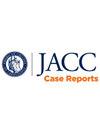Beyond Tachycardia-Induced Cardiomyopathy
Q4 Medicine
引用次数: 0
Abstract
Background
Tachycardia-induced cardiomyopathy (TICM) is typically reversible with rhythm control, but individual susceptibility remains poorly understood and may reflect genetic predisposition.
Case Summary
A 66-year-old woman with paroxysmal atrial fibrillation (AF) presented with new-onset heart failure. Genetic testing identified a likely pathogenic heterozygous ABCC9 gene variant (c.3892+2T>C), not previously associated with dilated cardiomyopathy or AF. ABCC9 loss-of-function mutations have been linked with cardiac channelopathies and cardiomyopathies. Ventricular function improved with rhythm control and medical therapy.
Discussion
This case illustrates the potential role of ABCC9 mutations in arrhythmia-induced cardiomyopathy beyond pure TICM. Although this variant has not been previously reported in affected individuals, existing models support its pathogenicity. The co-occurrence of prolonged QT, familial AF, and dilated cardiomyopathy underscores the value of genetic testing in cardiac disease.
Take-Home Messages
Genetic testing may reveal causes in atypical or treatment-resistant cardiomyopathies and arrhythmias. This novel ABCC9 variant suggests a genetic contribution to AF-induced cardiomyopathy beyond the expected course of TICM.
超越心动过速引起的心肌病:abcc9相关扩张性心肌病和家族性心房颤动。
背景:心动过速引起的心肌病(TICM)通常在节律控制下是可逆的,但个体易感性仍然知之甚少,可能反映遗传易感性。病例总结:一名66岁女性阵发性心房颤动(AF)表现为新发心力衰竭。基因检测发现一种可能的致病性杂合ABCC9基因变异(C .3892+2T>C),以前与扩张型心肌病或房颤无关。ABCC9功能丧失突变与心脏通道病变和心肌病有关。心律控制和药物治疗可改善心室功能。讨论:该病例说明了ABCC9突变在心律失常引起的心肌病中的潜在作用,而不仅仅是单纯的TICM。虽然这种变异以前没有在受影响的个体中报道过,但现有的模型支持其致病性。QT间期延长、家族性房颤和扩张性心肌病的共同发生强调了基因检测在心脏病中的价值。关键信息:基因检测可以揭示非典型或治疗难治性心肌病和心律失常的病因。这种新的ABCC9变异表明af诱导的心肌病的遗传贡献超出了TICM的预期病程。
本文章由计算机程序翻译,如有差异,请以英文原文为准。
求助全文
约1分钟内获得全文
求助全文
来源期刊

JACC. Case reports
Medicine-Cardiology and Cardiovascular Medicine
CiteScore
1.30
自引率
0.00%
发文量
404
审稿时长
17 weeks
 求助内容:
求助内容: 应助结果提醒方式:
应助结果提醒方式:


